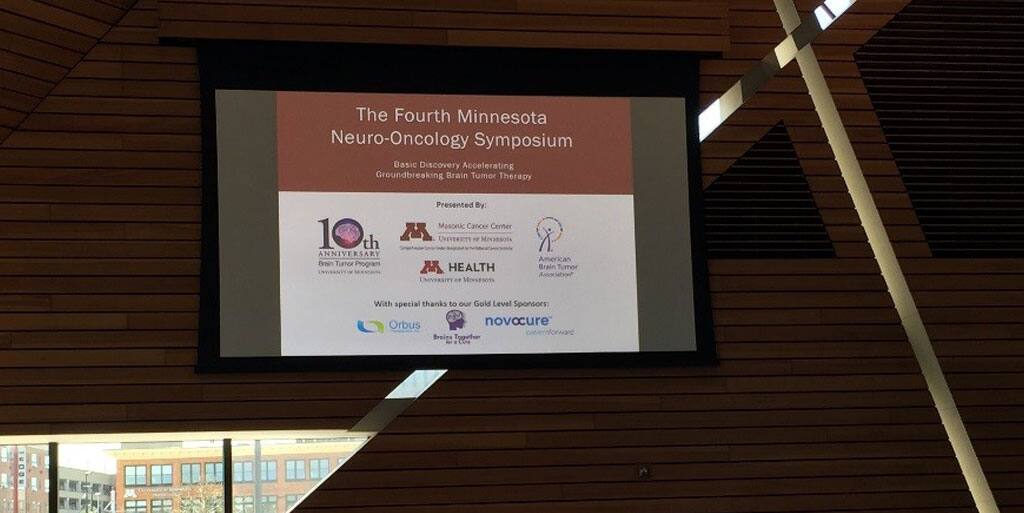Fourth Annual University of Minnesota Neuro-Oncology Symposium
Bio-Techne was pleased to be a sponsor of the 4th Annual University of Minnesota Neuro-Oncology Symposium. The preclinical Provider/Researcher program included 4 sessions: Physics and Modeling, Blood Brain Barrier, Genetics, and Immunotherapy/Emerging Therapies. The clinical Patient/Caregiver program included 2 sessions: Treatment & Therapies and Living with a Brain Tumor.
The Physics and Modeling Session focused mostly on cell culture model systems. Andre Levchenko of the Yale Systems Biology Institute discussed his model system that was used to understand why cells transition from a proliferative phenotype to an invasive/migratory phenotype. Research from his lab implicate YAP and PDGF signaling as drivers for invasive migratory cells in the brain. Sanjay Kumar of UC Berkeley discussed his laboratory’s mechano-transductive signaling research in the context of glioblastoma research. Kristin Swanson of Mayo Clinic, Phoenix discussed her patient specific clinical modeling research. Finally, David Odde of the University of Minnesota discussed his laboratory's biomarker related research. His take-home message was that although high or low protein expression levels are typically used as predictive or prognostic biomarkers, intermediate levels of expression may also have utility in the same context.
The second session focused on the Blood Brain Barrier. Michael Volgelbaum of the Cleveland Clinic lamented the lack of progress in the glioma field. He noted that investigators tend to focus on positive data but rarely do a failure analysis. He also advocated for the use of Phase 0 trials, to assess a drug's pharmacokinetic and pharmacodynamic profile before moving into phase 1 trials. Lester Drewes of the University of Minnesota-Duluth discussed research from his laboratory that indicates that endothelial cell metabolism may be a good cancer therapy target. Afroz Mohammad of UMN discussed Topoisomerase 1 inhibitors in the context of breast cancer metastasis to the brain. David Wood of UMN discussed model systems to study the metastasis of breast cancer to the brain. He hypothesized that metastatic cells utilize a pericelluar matrix to aid in metastasis.
The third session was Genetics. Tim Hallstrom of the University of Minnesota discussed his research focused on the hypothesis that Ubiquitin Like with PHD and Ring Finger Domains (UHRF2) is a tumor suppressor in retinoblastoma, a rare pediatric cancer. Kyle Williams, also of the University of Minnesota, discussed his drug screening studies for Neurofibromatosis Type 1 where the Neurofibromin 1 (NF1) protein is mutated. NF1 is thought to be a tumor suppressor that negatively regulates RAS signaling and thus is also involved in RASopathies. Annie Huang of U. Toronto discussed her laboratory’s research which is focused on the tumor suppressive role of SWI/SNF-related matrix associated actin dependent regulator of chromatin subfamily B member 1 (SMARCB1) in atypical teratoid rhabdoid tumors (ATRTs).
The final session of this program was Immunotherapy/Emerging Therapies. Frederick Lang of MD Anderson Cancer center discussed clinical trials the oncolytic virus Delta-24-RGD. It is selective for cancer cells (mutated rb in cancer cells), causing oncolysis and thereby stimulating an immune response. Noriyuki Kasahara of the University of Miami discussed the clinical outcomes of the selective targeting glioblastoma using the Toca511 retroviral replicating vector. Infected cells produce cytosine deaminase which converts 5-fluorocystine (5-FC) into the anti-cancer drug fluorouracil (5-FU). Michael Olin of the University of Minnesota discussed is laboratory’s research on that is focused on the inhibitory role of CD200 in ependymoma. Finally, Craig Horbinski of Northwestern University discussed the relationship between isocitrate dehydrogenase (IDH) mutations and glioma. There is evidence that IDH mutation status is a prognostic marker for cancer.
Learn more about our solutions for research at the intersection of Cancer biology, Immunology and Neuroscience:
Tools for Cancer Research
Tools for Cell Therapy Research
Tools for Immunology Research
Tools for Immunotherapy Research
Tools for Neuroscience Research
Reagents for Neuronal Cell Culture
